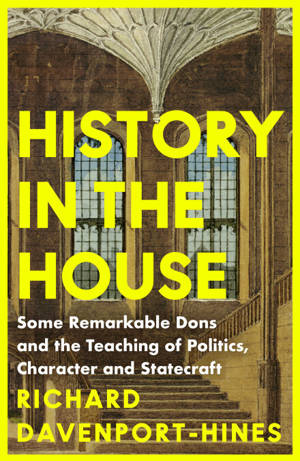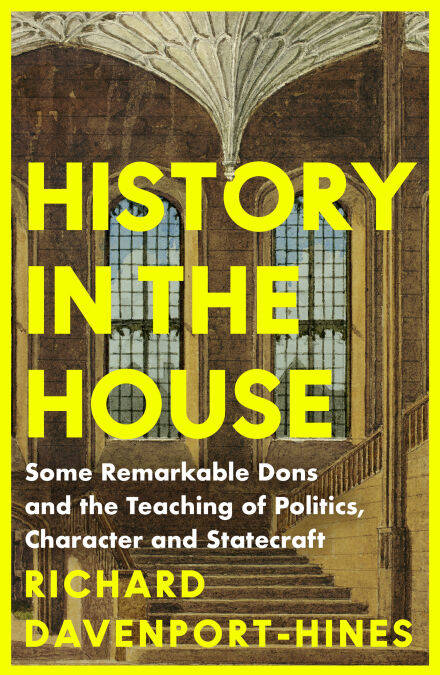
- Retrait gratuit dans votre magasin Club
- 7.000.000 titres dans notre catalogue
- Payer en toute sécurité
- Toujours un magasin près de chez vous
- Retrait gratuit dans votre magasin Club
- 7.000.0000 titres dans notre catalogue
- Payer en toute sécurité
- Toujours un magasin près de chez vous
History in the House EBOOK
Some Remarkable Dons and the Teaching of Politics, Character and Statecraft
Richard Davenport-Hines
Ebook | Anglais
27,20 €
+ 27 points
Format
Description
A Spectator Best Book of the Year; An Aspects of History Best Book of the Year; An Engelsberg Ideas Best Book of the Year
Five hundred years ago, Thomas Wolsey endowed in Oxford a foundation he called Cardinal‘s College. Henry VIII, the monarch who dismissed and ruined him, re-established it as Christ Church later in his reign as an institution rich, spacious and imposing beyond any other. It would help young men of Tudor England and beyond to study history, improve their minds, enlarge imaginations and broaden experience for the benefit of the realm – under the tutelage, of course, of some remarkable dons.
Generations of students had their intellects and world perspectives shaped by Oxford. It was believed that the study of history – touching the ancient world at one end and modern politics at the other – interlaced with geography, economics, political science, law and modern languages, would demonstrate the reasons for the success or failure of states. The student would be taught – in Sir Isaiah Berlin‘s memorable phrase – to ‘spot the bunk!’
In this book, acclaimed historian Richard Davenport- Hines examines the intimate connections between British politics, statecraft and the Oxford University history course. He explores the temperaments, ideas, imagination, prejudices, intentions and influence of a select and self-regulated group of men who taught modern history at Christ Church: Frederick York Powell, Arthur Hassall, Keith Feiling, J. C. Masterman, Roy Harrod, Patrick Gordon Walker, Hugh Trevor-Roper and Robert Blake; by turns an unruly Victorian radical, a staunch legitimist of the Protestant settlement, a Tory, a Whig, a Keynesian, a socialist, a rationalist who enjoyed mischief and a student of realpolitik.
These dons, with their challenging and sometimes contradictory opinions, explored with their pupils the wielding of power, the art of persuasion and the exercise of civil and political responsibility. Intelligent, strenuous and aware of the treachery and uncontrollability of things in the world, they studied the crimes, follies, misfortunes, incapacity, muddle and disloyalty of humankind in every generation. History in the House offers an unforgettable portrait of these men, their enduring influence and the significance of their arguments to public life today.
Five hundred years ago, Thomas Wolsey endowed in Oxford a foundation he called Cardinal‘s College. Henry VIII, the monarch who dismissed and ruined him, re-established it as Christ Church later in his reign as an institution rich, spacious and imposing beyond any other. It would help young men of Tudor England and beyond to study history, improve their minds, enlarge imaginations and broaden experience for the benefit of the realm – under the tutelage, of course, of some remarkable dons.
Generations of students had their intellects and world perspectives shaped by Oxford. It was believed that the study of history – touching the ancient world at one end and modern politics at the other – interlaced with geography, economics, political science, law and modern languages, would demonstrate the reasons for the success or failure of states. The student would be taught – in Sir Isaiah Berlin‘s memorable phrase – to ‘spot the bunk!’
In this book, acclaimed historian Richard Davenport- Hines examines the intimate connections between British politics, statecraft and the Oxford University history course. He explores the temperaments, ideas, imagination, prejudices, intentions and influence of a select and self-regulated group of men who taught modern history at Christ Church: Frederick York Powell, Arthur Hassall, Keith Feiling, J. C. Masterman, Roy Harrod, Patrick Gordon Walker, Hugh Trevor-Roper and Robert Blake; by turns an unruly Victorian radical, a staunch legitimist of the Protestant settlement, a Tory, a Whig, a Keynesian, a socialist, a rationalist who enjoyed mischief and a student of realpolitik.
These dons, with their challenging and sometimes contradictory opinions, explored with their pupils the wielding of power, the art of persuasion and the exercise of civil and political responsibility. Intelligent, strenuous and aware of the treachery and uncontrollability of things in the world, they studied the crimes, follies, misfortunes, incapacity, muddle and disloyalty of humankind in every generation. History in the House offers an unforgettable portrait of these men, their enduring influence and the significance of their arguments to public life today.
Spécifications
Parties prenantes
- Auteur(s) :
- Editeur:
Contenu
- Nombre de pages :
- 432
- Langue:
- Anglais
Caractéristiques
- EAN:
- 9780008285746
- Date de parution :
- 19-06-24
- Format:
- Ebook
- Protection digitale:
- Adobe DRM
- Format numérique:
- ePub

Les avis
Nous publions uniquement les avis qui respectent les conditions requises. Consultez nos conditions pour les avis.






